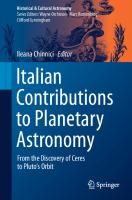Epitome of Copernican Astronomy & Harmonies of the World 1573920363
The brilliant German mathematician Johannes Kepler (1571-1630), one of the founders of modern astronomy, revolutionized
360 23 195MB
English Pages 245 [268] Year 1995
Cover
Also Available
JOHANNES KEPLER
Epitome of Copernican Astronomy
Contents
BOOK FOUR
BOOK FIVE
Harmonies of the World
Contents
BOOK FIVE
Recommend Papers

- Author / Uploaded
- Johannes Kepler
- Charles Glenn Wallis (trans.)
File loading please wait...
Citation preview
CI K363 995
.
•
•
•
••
,.
-
•
-
•
•
•
'
•
••
, •r,
•
,.•
~
•
•
•,
# I
••
'
..
~
•
•'
~
•
•
' •
'
Oi it iz
b
.. ,,.
•
Digitized by
Google
Original from
UNIVERSITY OF MICHIGAN
Digitized by
Google
Original from
UNIVERSITY OF MICHIGAN
&
Di itize
u Jl
Digitized by
Google
Original from
UNIVERSITY OF MICHIGAN
OIIJ\NNES
GREAT MINDS SERIES
eus 59 Joh n Gl enn Drive Am her st, Ne w·York 142 28 . . 2 97
ri i
U I
SI
I fr
0
1
ICH GA
Published 1995 by Prometheus Books 59 John Glenn Drive, Amherst, New York 14228-2197, 716-691-0133.FAU{:716-691-0137.
Cataloging-in-Publication Data Kepler, Johannes, 1571-1630. (Epitome astronomiae copernicanae. English] Epitome of Copernican astronomy ; and, harmonies of the world I Johannes Kepler ; translated by Charles Glenn Wallis. p. can. (Great tninds series) Originally published: Annapolis : The St. John's Bookstore, c1939.
ISBN 1-57392-036-3 (pbk.: alk. paper) 1. Astronomy Early works to 1800. 2. Kepler, Johannes, 1571-1630. Harmonices mundi. English. I. Kepler, Johannes, 1571-1630. Harmonices mundi. English. 11. Title. Ill. Title: Harmonies of the world. rv. Series. QB41.K3413 520--dc20
1995 95-35655 CIP
Printed in the United States of America on acid-free paper.
Digitized by
Google
Original from
UNIVERSITY OF MICHIGAN
.
. ........
-·
... '
.
.
'
.. .
/'
Also Available in Prometheus's Great Paperback Series
Nicolaus Copemicus On the Revolutions of Heavenly Spheres Charles Darwin The Origin ofSpecies
Herodotus The History Julian Huxley Evolutionary Humanism
Albert Einstein Relativity
Thomas Henry Huxley Agnosticism and Christianity and Other Essays
Desiderius Erasmus The Praise ofFolly
lsaac Newton The Principill
Michael Faraday The Forces ofManer
Ernest Renan The Life ofJesus
Galileo Galilei
AdamSmith
Dialogues Concerning 1Wo New Sciences
Wealth of Nations
Edward Gibbon On Christianity Charlotte Perkins Gilman Women and Economics Emst Haeckel The Riddle of the Universe William Harvey On the Motion of the Heart and Blood in Animals
Jonathan Swift A Modest Proposal and Other Satires Voltaire A Treatise on Toleration and Other Essays
H. G. Wells The Conquest of Tune Andrew D. White A History of the Warfare ofScience with Theology in Christendom
See the back of this volume for a complete list of titles in Prometheus's Great Books in Philosophy and Great Minds series.
Digitized by
Google
Original from
UNIVERSITY OF MICHIGAN
Digitized by
Go~le
Original from
UNIVERSITY OF MICHIGAN
the great German astronomer, was born at Weil, in the duchy ofWurttemberg, on December 27, 1571, into a faanily of obscure and impoverished nobility. Kepler began school at Leonberg in 1577, but fan1ily soon forced the child to leave school and go to work as a field hand. Since Kepler's mental aptitude, along with his bodily infiranity (he had suffered from smallpox as a child), seemed to suit hi an for a theological vocation, he was sent as a charity student to the se1ninary at Adelberg in 1584 and later to Maulbronn. His academic brilliance assured him entrance to the University of Tiibingen (1588), where, in addition to the classical cuniculu1n, he studied astronomy under Michael Mastlin. In 1594 Kepler gave up a career in the ministry to accept the chair of astronomy at Graz. While at Graz, Kepler discovered an imaginary relation between the six then known planets and the five regular solids of geometry the tetrahedron, the cube, the dodecahedron, and the · 'Ibis the discovery, published in his Precursor of Cosmographic Dissertations, or the Cosmographic Mystery (Prodromus dissertationum cosmographicarwn seu mysterium cosmographicum) (1596), brought Kepler his first fa1ne and put him in contact with Galileo and the Danish astronomer 'JYcho Brahe. In 1598 Ferdinand, the Catholic archduke of Styria, issued an edict of banishment against Protestant preachers and professors, forcing Kepler to flee with his wife and farnily to the Hungarian border. Though reinstated in his post at Graz, in 1600 Kepler accepted an offer from 'JYcho Brahe to become his assistant at his observatory near Prague. Following Brahe's death one year later, the emperor Rudolph n appointed Kepler jOHANNES I





![Rourkeis Enciclipaedia World of Science. Astronomy and Space [Vol7]](https://ebin.pub/img/200x200/rourkeis-enciclipaedia-world-of-science-astronomy-and-space-vol7.jpg)



